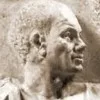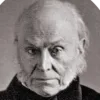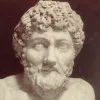The man of firm and righteous will,
No rabble, clamorous for the wrong,
No tyrant’s brow, whose frown may kill,
Can shake the strength that makes him strong.[Iustum et tenacem propositi virum
non civium ardor prava iubentium,
non voltus instantis tyranni
mente quatit solida]Horace (65-8 BC) Roman poet, satirist, soldier, politician [Quintus Horatius Flaccus]
Odes [Carmina], Book 3, # 3, l. 1ff (3.3.1-4) (23 BC) [tr. Conington (1872)]
(Source)
(Source (Latin)). Alternate translations:An honest and resolved man,
Neither a peoples tumults can,
Neither a Tyrants indignation,
Un-center from his fast foundation.
[tr. Fanshaw; ed. Brome (1666)]Not the rage of the people pressing to hurtful measures, not the aspect of a threatening tyrant can shake from his settled purpose the man who is just and determined in his resolution.
[tr. Smart/Buckley (1853)]He that is just, and firm of will
Doth not before the fury quake
Of mobs that instigate to ill,
Nor hath the tyrant's menace skill
His fixed resolve to shake.
[tr. Martin (1864)]Not the rage of the million commanding things evil,
Not the doom frowning near in the brows of the tyrant,
Shakes the upright and resolute man
In his solid completeness of soul.
[tr. Bulwer-Lytton (1870)]Neither the fury of the populace, commanding him to do what is wrong, nor the face of the despot which confronts him, [...] shakes from his solid resolve a just and determined man.
[tr. Elgood (1893)]The just man, in his purpose strong,
No madding crowd can bend to wrong.
The forceful tyrant's brow and word,
[...] His firm-set spirit cannot move.
[tr. Gladstone (1894)]Him who is just, and stands to his purpose true.
Not the unruly ardour of citizens
Shall shake from his firm resolution,
Nor visage of the oppressing tyrant.
[tr. Phelps (1897)]The upright man holding his purpose fast,
No heat of citizens enjoining wrongful acts,
No overbearing despot's countenance,
Shakes from his firm-set mind.
[tr. Garnsey (1907)]The man that's just and resolute of mood
No craze of people's perverse vote can shake,
Nor frown of threat'ning monarch make
To quit a purposed good.
[tr. Marshall (1908)]The man tenacious of his purpose in a righteous cause is not shaken from his firm resolve by the frenzy of his fellow citizens bidding what is wrong, not by the face of threatening tyrant.
[tr. Bennett (Loeb) (1912)]Who loves the Right, whose will is resolute,
His purpose naught can shake — nor rage of brute
Mob bidding him work evil; nor the eye
Of threatening despot
[tr. Mills (1924)]A mob of citizens clamouring for injustice,
An autocrat's grimace of rage [...] cannot stagger
The just and steady-purposed man.
[tr. Michie (1963)]The man who knows what's right and is tenacious
In the knowledge of what he knows cannot be shaken.
Not by people righteously impassioned
In a wrong cause, and not by menacings
Of tyrants' frowns.
[tr. Ferry (1997)]The just man, tenacious in his resolve,
will not be shaken from his settled purpose
by the frenzy of his fellow citizens
imposing that evil be done,
or by the frown of a threatening tyrant.
[tr. Alexander (1999)]The passion of the public, demanding what
is wrong, never shakes the man of just and firm
intention, from his settled purpose,
nor the tyrant’s threatening face.
[tr. Kline (2015)]Neither the passion of citizens demanding crooked things,
Not the face of a threatening tyrant
Shakes the man who is righteous and set in purpose
From his strong mind.
[tr. Wikisource (2021)]
Quotations about:
tyrant
Note not all quotations have been tagged, so Search may find additional quotes on this topic.
Nearly all of history is only a string of horrors. If tyrants dismiss it while they are alive, it seems that their successors allow people to transmit to posterity the crimes of their predecessors, in order to offer diversion away from the horror that they inspire themselves.
[Presque toute l’Histoire n’est qu’une suite d’horreurs. Si les tyrans la détestent, tandis qu’ils vivent, il semble que leurs successeurs souffrent qu’on transmette à la postérité les crimes de leurs devanciers, pour faire diversion à l’horreur qu’ils inspirent eux-mêmes.]
Nicolas Chamfort (1741-1794) French writer, epigrammist (b. Nicolas-Sébastien Roch)
Products of Perfected Civilization [Produits de la Civilisation Perfectionée], Part 1 “Maxims and Thoughts [Maximes et Pensées],” ch. 8, ¶ 474 (1795) [tr. Siniscalchi (1994)]
(Source)
(Source (French)). Alternate translations:Nearly all History is a procession of horrors; but, although tyrants hate History in their own lifetime, a general transmission of such crimes is not unpleasing to their descendants, for it distracts attention from their own.
[tr. Mathers (1926)]Almost the whole of history is nothing but a series of horrors. If tyrants detest it while they are alive, their successors seem willing to allow the crimes of their predecessors to be transmitted to posterity, to divert attention from the horror that they themselves inspire.
[tr. Merwin (1969)]Almost the whole of history is nothing more than a series of horrors. If tyrants detest it while they are alive, it seems that their that their successors suffer that the crimes of their predecessors should be laid at the door of posterity, in order to divert attention from the horrors to which they themselves give rise.
[tr. Pearson (1973)]Almost all of history is a story of horror. If tyrants condemn it during their lifetime, their successors seem to allow the crimes of their predecessors to be passed on to posterity, thereby diverting attention from the horror they themselves inspire.
[tr. Parmée (2003)]
PERICLES: I knew him tyrannous, and tyrants’ fears
Decrease not but grow faster than the years.William Shakespeare (1564-1616) English dramatist and poet
Pericles, Act 1, sc. 2, l. 91ff (1.2.91-92) (1607) [with George Wilkins]
(Source)
Despotic authority attaches great importance to being considered strong, and much less to being admired for its wisdom. Besides, what does wisdom mean to a despot? It means skill in the use of power. The wise despot knows when and how to strike. This continual display of power is necessary because, at root, any dictatorship appeals to the lowest instincts of the governed: fear, aggressiveness toward one’s neighbors, bootlicking. Terror most effectively excites such instincts, and fear of strength is the wellspring of terror.
Ryszard Kapuściński (1932-2007) Polish journalist, photographer, poet, author
Shah of Shahs (1982)
(Source)
The mistake is to assume that rulers who came to power through institutions cannot change or destroy those very institutions — even when that is exactly what they have announced that they will do.
Timothy Snyder (b. 1969) American historian, author
On Tyranny: Twenty Lessons from the Twentieth Century (2017)
(Source)
Their guards also are such as are used in a kingly government, not a despotic one; for the guards of their kings are his citizens, but a tyrant’s are foreigners. The one commands, in the manner the law directs, those who willingly obey; the other, arbitrarily, those who consent not. The one, therefore, is guarded by the citizens, the other against them.
[οἱ γὰρ πολῖται φυλάττουσιν ὅπλοις τοὺς βασιλεῖς, τοὺς δὲ τυράννους ξενικόν: οἱ μὲν γὰρ κατὰ νόμον καὶ ἑκόντων οἱ δ᾽ ἀκόντων ἄρχουσιν, ὥσθ᾽ οἱ μὲν παρὰ τῶν πολιτῶν οἱ δ᾽ ἐπὶ τοὺς πολίτας ἔχουσι τὴν φυλακήν.]
Aristotle (384-322 BC) Greek philosopher
Politics [Πολιτικά], Book 3, ch. 14 / 1285a25 [tr. Ellis (1776)]
(Source)
Original Greek. Alternate translations:
- "The guard of the king is, for the same cause, one that belongs to a monarch and not to a tyrant, for the citizens protect their kings with their arms; but it is aliens who guard despots. For the former rule legally over willing subjects, the latter over unwilling; so that the former are guarded by their subjects, the latter against them." [tr. Bolland (1877)]
- "Wherefore also their guards are such as a king and not such as a tyrant would employ, that is to say, they are composed of citizens, whereas the guards of tyrants are mercenaries. For kings rule according to the law over voluntary subjects, but tyrants over involuntary; and the one are guarded by their fellow-citizens, the others are guarded against them." [tr. Jowett (1921)]
- "Also their bodyguard is of a royal and not a tyrannical type for the same reason; for kings are guarded by the citizens in arms, whereas tyrants have foreign guards, for kings rule in accordance with law and over willing subjects, but tyrants rule over unwilling subjects, owing to which kings take their guards from among the citizens but tyrants have them to guard against the citizens." [tr. Rackham (1944)]
- "For the same reason, their bodyguard is of a kingly rather than a tyrannical sort. For the citizens guard kings with their own arms, while a foreign element guards the tyrant, since the former rule willing persons in accordance wit the law, while the latter rule unwilling persons. So the ones have a bodyguard provided by the citizens, the other one that is directed against them." [tr. Lord (1984)]
- "And their bodyguards are kingly and not tyrannical due to the same cause. For citizens guard kings with their weapons, whereas a foreign contingent guards tyrants. For kings rule in accord with the law and rule voluntary subjects, whereas the latter rule involuntary ones, so that the former have bodyguards drawn from the citizens, whereas the latter have bodyguards to protect them against the citizens." [tr. Reeve (2007)]
- "Citizens guard their kings with arms; foreigners protect tyrants. This is because kings rule according to the law and with willing citizens while tyrants rule the unwilling. As a result, kings have guards from their subjects and tyrants keep guards against them." [tr. @sentantiq]
The only man for whom Hitler had “unqualified respect” was “Stalin the genius,” and while in the case of Stalin and the Russian regime we do not have (and presumably never will have) the rich documentary material that is available for Germany, we nevertheless know since Khrushchev’s speech before the Twentieth Party Congress that Stalin trusted only one man and that was Hitler.
Hannah Arendt (1906-1975) German-American philosopher, political theorist
The Origins of Totalitarianism, Part 3, ch. 10 “A Classless Society,” sec. 1 (1951)
(Source)
AGATHA: … But after that, I’d better see some cake.
TARVEK: You know, there’s more to being an evil despot than getting cake whenever you want it.
AGATHA: If that’s what you think, then you’re doing it wrong!Phil Foglio (b. 1956) American writer, cartoonist
Girl Genius, Vol. 13, p. 38, “The Heterodyne Requires Cake” (10 Apr 2013)
(Source)
In Agatha H. and the Siege of Mechanicsburg (2020) [with Kaja Foglio], this is rendered:“But after that, I’d better see some cake.”
Tarvek glanced at her. “You know, there’s more to being an evil despot than getting cake whenever you want it.”
Agatha thought about this and was filled with a sudden conviction, one that would stand the test of time through everything else that happened to her through the years. “If that’s what you think, then you’re doing it wrong.”
The tyrant grinds down his slaves and they don’t turn against him, they crush those beneath them.
Emily Brontë (1818-1848) British novelist, poet [pseud. Ellis Bell]
Wuthering Heights, ch. 11 [Heathcliff] (1847)
(Source)
It’s said that “power corrupts,” but actually it’s more true that power attracts the corruptible. The sane are usually attracted by other things than power. When they do act, they think of it as service, which has limits. The tyrant, though, seeks mastery, for which he is insatiable, implacable.
David Brin (b. 1950) American scientist and author
The Postman, ch. 14 (1985)
Often paraphrased: "It is said that power corrupts, but actually it's more true that power attracts the corruptible. The sane are usually attracted by other things than power." See Frank Herbert.
I believe any man who takes the liberty of another into his keeping is bound to become a tyrant, and that any man who yields up his liberty, in however slight the measure, is bound to become a slave.
If I had to choose, I should detest the tyranny of one man less than that of many. A despot always has his good moments; an assembly of despots never.
Voltaire (1694-1778) French writer [pseud. of Francois-Marie Arouet]
Philosophical Dictionary, “Tyranny” (1764) [tr. Gay (1962)]
(Source)
Let them take arms. The remedy is to set them right as to facts, pardon and pacify them. What signify a few lives lost in a century or two? The tree of liberty must be refreshed from time to time with the blood of patriots and tyrants. It is it’s natural manure.
Thomas Jefferson (1743-1826) American political philosopher, polymath, statesman, US President (1801-09)
Letter (1787-11-13) to William Stephens Smith
(Source)
It is the old practice of despots to use a part of the people to keep the rest in order.
Thomas Jefferson (1743-1826) American political philosopher, polymath, statesman, US President (1801-09)
Letter (1798-06-04) to John Taylor
(Source)
We must not conclude merely upon a man’s haranguing upon liberty, and using the charming sound, that he is fit to be trusted with the liberties of his country. It is not unfrequent to hear men declaim loudly upon liberty, who, if we may judge by the whole tenor of their actions, mean nothing else by it but their own liberty, — to oppress without control or the restraint of laws all who are poorer or weaker than themselves.
He that fears you present, will hate you absent.
Thomas Fuller (1654-1734) English physician, preacher, aphorist, writer
Gnomologia: Adages and Proverbs (compiler), # 2101 (1732)
(Source)
Any excuse will serve a tyrant.
Aesop (620?-560? BC) Legendary Greek storyteller
Fables [Aesopica], “The Wolf and the Lamb” (6th C BC) [tr. Jacobs (1894)]
(Source)
Alternate translations:
- "'Tis an Easie Matter to find a Staff to Beat a Dog." [tr. L'Estrange (1692)]
- "A tyrant never wants a plea." [tr. James (1848)]
- "The tyrant will always find a pretext for his tyranny." [tr. Townsend (1887)]
If you don’t understand that you work for your mislabeled “subordinates,” then you know nothing of leadership. You know only tyranny.
Dee W. Hock (1929-2022) American businessman
“Unit of One Anniversary Handbook,” Fast Company (1997-02-28)
(Source)
DESTINY, n. A tyrant’s authority for crime, and a fool’s excuse for failure.
Ambrose Bierce (1842-1914?) American writer and journalist
“Destiny,” The Cynic’s Word Book (1906)
(Source)
























